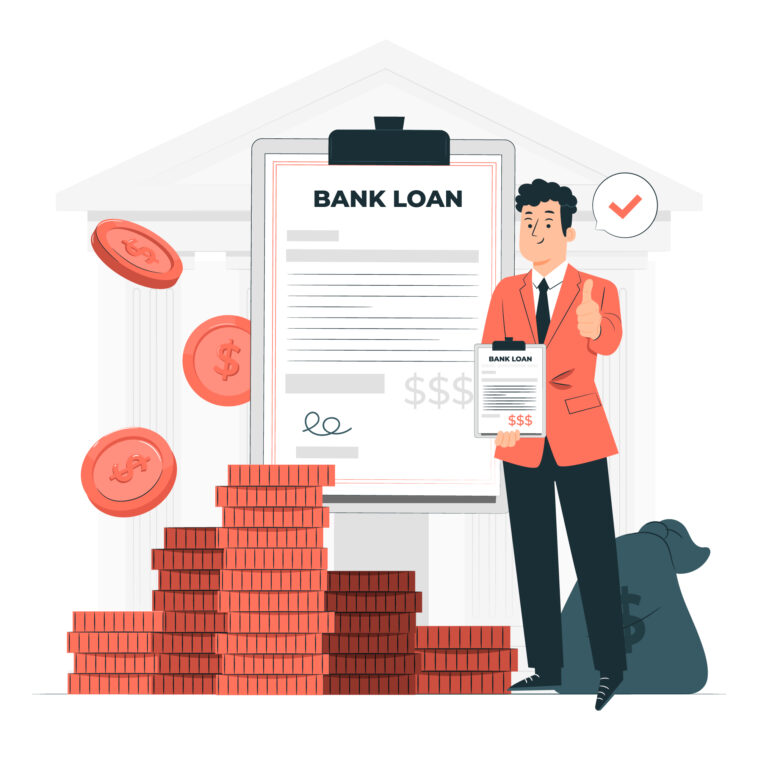Bank loans are one of the most common ways for individuals and businesses to finance major purchases, investments, or to address financial needs. Whether you’re buying a home, starting a business, or consolidating debt, a bank loan can provide the funding needed to reach your goals.
This guide breaks down the different types of bank loans, the application process, factors that affect approval, and tips to increase your chances of securing a loan. With the right knowledge, you can navigate the bank loan process and choose the best financing option for your needs.
1. What is a Bank Loan?
A bank loan is a sum of money borrowed from a bank, which the borrower agrees to repay over time with interest. Banks offer loans for a variety of purposes, from mortgages and personal expenses to business growth and large investments. Loan terms, interest rates, and approval criteria vary depending on the type of loan and the borrower’s creditworthiness.
Bank loans can be secured (backed by collateral) or unsecured (no collateral required), and terms typically range from a few months to several years, depending on the loan type and purpose.
2. Types of Bank Loans
Banks offer a wide range of loan types, each designed for specific financial needs. Here’s an overview of the most common types of bank loans:
Personal Loans
Personal loans are unsecured loans that can be used for various purposes, such as consolidating debt, financing a vacation, or covering medical expenses. They generally have fixed interest rates and repayment terms ranging from one to seven years.
Mortgage Loans
Mortgage loans are long-term, secured loans used to purchase or refinance real estate. They usually have terms of 15 to 30 years and are repaid through monthly installments. Mortgages can have fixed or variable interest rates and often require a down payment.
Auto Loans
Auto loans are secured loans specifically for purchasing a vehicle. The vehicle serves as collateral, which means the lender can repossess it if you fail to repay the loan. Auto loan terms typically range from two to seven years.
Home Equity Loans and Lines of Credit (HELOC)
Home equity loans and HELOCs are secured by the borrower’s home and allow homeowners to borrow against their home equity. Home equity loans provide a lump sum with fixed payments, while HELOCs offer a revolving line of credit. They are often used for home improvements or large expenses.
Business Loans
Business loans are used to finance startup costs, expansion, inventory, or other business needs. Banks offer various business loans, including term loans, lines of credit, and Small Business Administration (SBA) loans, with terms and rates tailored to business needs.
Student Loans
Student loans help cover the cost of higher education and come with special terms like deferred payments until after graduation. While federal student loans are available, private banks also offer student loans with varying terms and interest rates.
Debt Consolidation Loans
Debt consolidation loans combine multiple debts into a single loan with a lower interest rate, making repayment more manageable. These loans can help borrowers pay down high-interest credit card debt or other loans.
Each of these loans serves a specific purpose, and understanding the options available helps you make informed decisions when choosing the right loan for your needs.
3. The Bank Loan Application Process
The process of applying for a bank loan may vary slightly depending on the type of loan and the bank’s requirements, but it generally involves the following steps:
- Determine Loan Needs and Eligibility: Decide on the loan amount, type, and repayment term that fits your needs. Review eligibility requirements like credit score, income, and collateral if needed.
- Gather Required Documents: Banks typically require documents like identification, proof of income, tax returns, and bank statements. For business loans, you may need a business plan, financial statements, and revenue projections.
- Submit Loan Application: Fill out the bank’s loan application form, either online or in person. The application may include questions about your financial history, credit, and employment.
- Credit and Financial Review: The bank reviews your credit score, debt-to-income ratio, and overall financial health to determine your ability to repay the loan.
- Approval and Terms: If approved, the bank provides loan terms, including interest rate, fees, and repayment schedule. You can accept the offer or negotiate if terms are flexible.
- Sign Loan Agreement: Once terms are agreed upon, you sign the loan agreement, which outlines all repayment obligations. The bank then disburses the loan funds.
This process may take anywhere from a few days to several weeks, depending on the loan type and the bank’s processing time. Mortgage and business loans often require a more extensive review, while personal loans may have quicker approval times.
4. Key Factors That Affect Loan Approval
When applying for a bank loan, understanding the factors that impact approval can help you improve your chances. Here are the main elements banks consider:
- Credit Score: A high credit score (usually 700 or above) increases your likelihood of approval and can qualify you for lower interest rates. Banks assess credit history to gauge your reliability as a borrower.
- Debt-to-Income (DTI) Ratio: DTI ratio is calculated by dividing your total monthly debt payments by your monthly income. A lower DTI ratio demonstrates a strong ability to manage new debt.
- Collateral: For secured loans, banks may require collateral, such as a vehicle or home, to minimize their risk. Having collateral can improve approval chances and lead to better terms.
- Employment and Income Stability: Stable employment and a steady income reassure banks of your ability to make consistent payments. Self-employed individuals may need additional income documentation.
- Loan Purpose: The intended use of the loan (e.g., home purchase, business expansion) influences terms and requirements. Business and mortgage loans often require detailed information about the purchase or investment.
By understanding these criteria, you can address potential issues in advance, improving your chances of getting approved for a loan.
5. How to Improve Your Chances of Loan Approval
Securing a bank loan may seem daunting, but there are steps you can take to increase your approval odds:
- Improve Your Credit Score: Pay off outstanding debts, make on-time payments, and reduce credit card balances to improve your credit score. Check your credit report for any errors and address them before applying.
- Reduce Debt-to-Income Ratio: Pay down existing debt to lower your DTI ratio. If your DTI is above 40%, consider consolidating debt or reducing expenses to free up income.
- Provide Collateral: Offering collateral, like a car or property, can improve approval chances for secured loans. Collateral minimizes the bank’s risk and can lead to better terms.
- Show a Stable Income: For employed applicants, providing recent pay stubs or tax returns demonstrates income stability. Self-employed applicants should consider submitting several years of income history.
- Prepare a Strong Application: Include all requested documents, complete the application accurately, and be prepared to explain your loan purpose clearly. A well-prepared application shows the lender you’re organized and reliable.
Implementing these strategies can increase your chances of loan approval and may result in more favorable terms, such as lower interest rates or longer repayment periods.
6. Pros and Cons of Bank Loans
Before committing to a bank loan, consider the pros and cons to ensure it’s the right decision for your financial goals.
Pros of Bank Loans
- Lower Interest Rates: Banks often offer lower interest rates than credit cards or online lenders, especially for borrowers with strong credit.
- Flexible Terms: Bank loans come with flexible repayment terms, allowing borrowers to choose a loan period that aligns with their budget.
- High Loan Amounts: Banks typically offer larger loan amounts, making them ideal for significant purchases like home buying, business expansion, or debt consolidation.
- Improved Credit Score: Successfully repaying a bank loan can boost your credit score and improve your creditworthiness.
Cons of Bank Loans
- Strict Approval Requirements: Bank loans often require good credit, a low DTI ratio, and substantial documentation, making it challenging for some borrowers to qualify.
- Potential Collateral Requirement: Secured loans may require collateral, which puts your assets at risk if you default on the loan.
- Slow Approval Process: Compared to online lenders, banks often have slower approval processes, which can be inconvenient if you need quick funding.
- Fees and Penalties: Bank loans may come with origination fees, processing fees, or prepayment penalties that increase the overall cost of borrowing.
By weighing these pros and cons, you can make a more informed decision about whether a bank loan is the best option for your needs.
Conclusion
Bank loans offer valuable funding options for a wide range of needs, from personal expenses to business growth. By understanding the different types of bank loans, the application process, and factors that affect approval, you can choose the loan that best aligns with your financial goals.
Improving your credit score, reducing debt, and preparing a thorough application can increase your chances of approval and result in better loan terms. Whether you’re planning to buy a home, start a business, or consolidate debt, a bank loan can be a powerful tool for achieving your goals with manageable payments.
FAQ
What credit score do I need for a bank loan?
Most banks require a credit score of at least 650 for standard loans, while higher scores (700+) improve chances for approval and better terms. Some specialized loans, like FHA mortgages, may accept lower scores.
Can I get a bank loan with no collateral?
Yes, unsecured loans like personal loans don’t require collateral. However, collateral is needed for secured loans like auto loans, mortgages, and some business loans, which can result in lower interest rates.
How long does it take to get approved for a bank loan?
Approval times vary by loan type. Personal and auto loans can take a few days, while mortgages and business loans may take several weeks due to underwriting and documentation requirements.
What is the difference between a fixed and variable interest rate?
A fixed interest rate remains constant throughout the loan term, providing predictable payments. A variable interest rate fluctuates with the market, which can lower payments during periods of low rates but may increase costs if rates rise.
Are there fees associated with bank loans?
Yes, bank loans often include fees such as origination fees, processing fees, or prepayment penalties. It’s essential to review loan terms and ask about fees to understand the total cost of borrowing.



